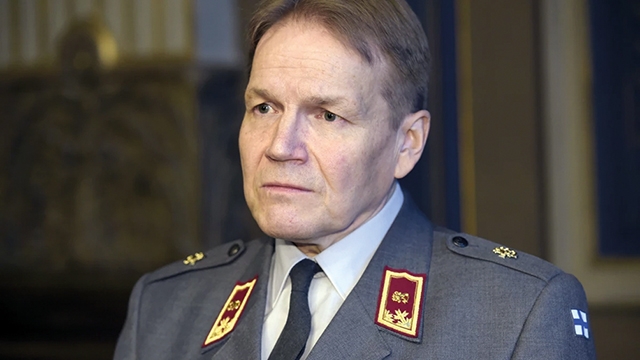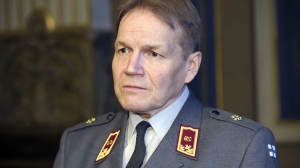Finland’s General-Major Harri Ohra-Aho on Hybrid Threats & Russia
Interview
November 30 marked the 80th anniversary of the Winter War, a David and Goliath struggle between Finland and the Soviet Union. Officially, Finland lost, and the USSR seized the Karelian Isthmus, but why is it that the whole world considers Finland victorious? General-Major Harri Ohra-Aho shared some of the much-needed Finnish know-how on dealing with the big neighbor with the Georgian Institute for Security.
When talking about Georgia in terms of hybrid threats, we basically mean Russia, which is the number one supplier when it comes to hybrid threats to Georgia. Is the same the case in Finland?
We don't point at any country: we are defending our country as a militarily non-aligned country wherever necessary, but of course we are following events closely. Sweden and Estonia belong to the same union, the European Union, and Norway is one of our best neighbors, which is part of NATO, and of course we are following very carefully what is happening in Russia, we don't see that Russia is a “military threat” as such, but then again we see the situation between Russia and the West with all the sanctions, what Russia has done in illegally annexing Crimea, the ongoing war in eastern Ukraine, and before that what happened in Georgia in 2008 and the two occupied areas of Abkhazia and South Ossetia.
In the past, Finland also lost land to Russia. Does that play any role in the perception of Russia in Finnish society?
What our grandfathers and grandmothers did during the Winter War and Second World War was very bravely done. We were totally alone during the Winter War and then after the war we lost 10% of our land and had to relocate all the Finnish people who lived in the area, 400,000 people, all over Finland and of course that was a very sad thing. But what was even more important is that our independence prevailed.
What’s the secret of the Finnish resilience?
We have to remember that we have had our own liberation war, civil war, in 1918, there were brothers against brothers in Finland and after 20 years we stood together to repel an attacker in what we call the “Wonder of the Winter War.” That will to defend our country is the main reason for that resilience and actually some way or another both sides, which had been fighting against each other, stood together. We understood the behavior of the Soviet Union, the Molotov-Ribbentrop Pact of 1939 which was signed just before Germany invaded Poland, and on the 17th of September the Soviet Union started their invasion and we were part of that pact so we mobilized all the troops that we had and joined. I'm very appreciative of not only the men but also the women who participated.
You mentioned the will to defend one’s country. How much does this will persist in modern day Finnish society?
It persists very much because we have a universal military conscription for males and also on a voluntary basis for females, and when we ask the conscripts “how willing are you to defend your country from five to one?” it has been 4.5 for every contingency. We also question all citizens in Finland “are you willing to defend your country with a weapon in your hand if the outcome is not sure?” and it's almost 80% who are willing to do so. If you compare that to the whole of Europe, it is the highest number.
Did the Finnish population reconcile themselves with that?
Just after the war, when four hundred thousand Finnish people were relocated throughout Finnish territory from Karelian Isthmus, of course they wanted to move back to their own farms, but the time was really difficult and dangerous in the last years of the 1940s, after which it was really difficult for Finland to be a neutral country between the rising Soviet Union and the rest of Europe. We tried to be realistic and pragmatic, there was a society called the Karelian Society who really promoted the idea that one day we would go back, but though it happened decades ago, it's ongoing for the second or third generation now and that's why we try to be pragmatic. When we look at the Russian leadership now, it’s no longer a tendency to talk about getting back Karelian Isthmus; it's not an issue anymore.
But leaderships change…
Sure, of course, but we really are rather realistic, especially in this situation, so sorry to say this, but it's different country.
Lots of Georgians might label that a pessimistic approach when we consider our own occupied territories. What is your advice on this?
I don't want to give advice to other countries. You have a really difficult situation that's for sure, and the good thing is that the countries that have recognized the breakaway regions as independent are few. International society is with Georgia in that sense. As to what to do to get them back, I’m not in a position to recommend your national leadership what to do.
Finland is not part of NATO and is a militarily non-aligned country. What does it take to be non-aligned in the modern world?
It has a long history and legacy, starting in the Second World War. We’re talking about the will to defend your own country: that is the key thing we are trying to keep, especially with the younger generation. We have to keep our conscription. Almost 80% of the male population of Finland goes for military training, and there is family behind those youngsters- everybody is involved some way or other to defend the country. We are only 5.5 million people, so we have rather large reserve, it's more than Germany has soldiers. Two hundred eighty thousand troops and those with military training makes 900 thousand; they do not belong to our defense forces or “mobilization” forces but they have training and, importantly, capabilities in modern military operations.
What about the technical capacity, military equipment and so on?
We are in the middle of replacing our hornet fleet, F-18s, and we now have more than 60 planes, and long-range capability, and the same goes for the army and navy and we are not yet decided what we are replacing our hornet fleets with, this decision is going to be made in 2021 and we have a few candidates: the F-35, F-18, Rafale, Eurofighter and Jas Gripen. We’re running tests on those planes in Finland in January-February in very harsh conditions in Lapland. From the naval side, we have just decided to purchase Corvettes for the Baltic Sea.
Does economic security and stability play any role in how non-aligned you can be?
Of course, because the will of the country is based on you being willing to defend the country you are living in, the social structures, everything. In our country, we have rather high taxes but we are willing to pay them and that's why we have a free healthcare system, free education, university education and so on. The willingness creates stability. At the same time, the education level is rather high so we understand the problems when it comes to hybrid threats. In fact, Finland has the highest media literacy in the EU.
So Finland is ever ready, ever vigilant.
Sure. We are ready and we are part of the EU. What the EU has done, the sanctions towards Russia; we are part of it.
By Vazha Tavberidze
Image source: svenska.yle.fi











